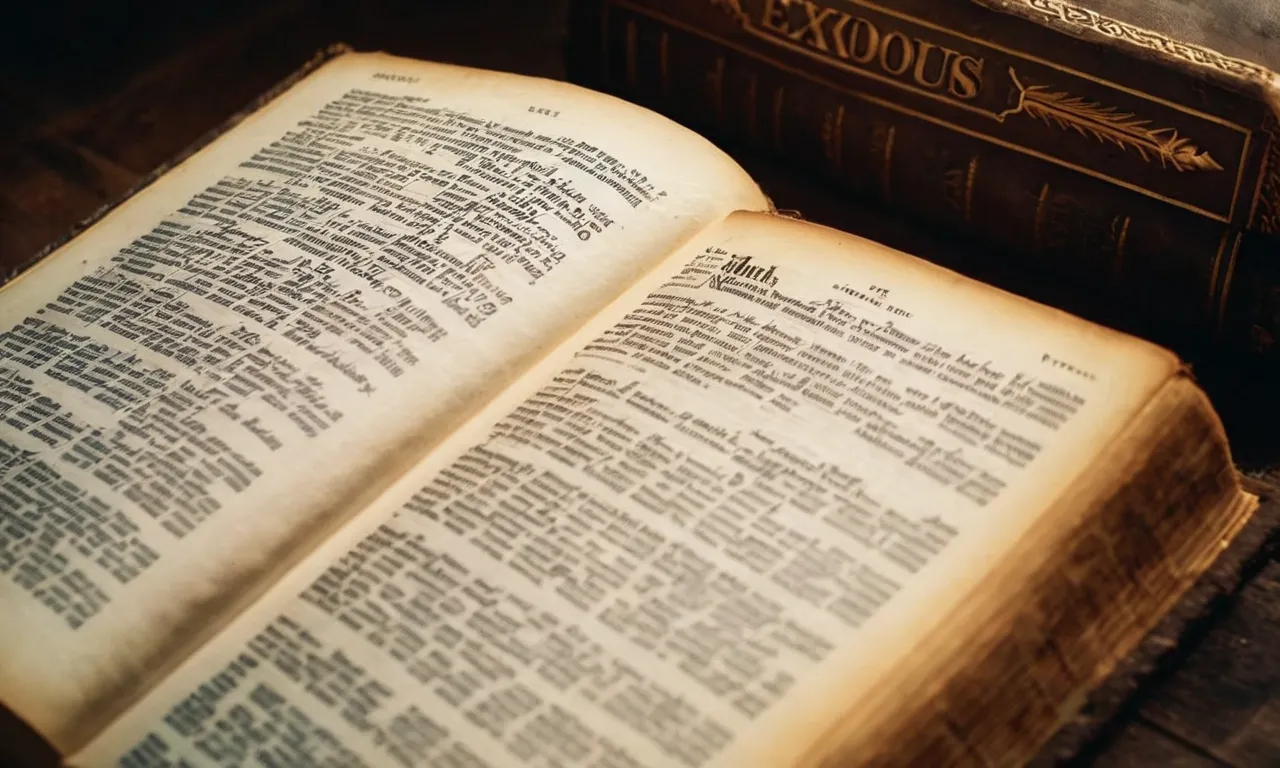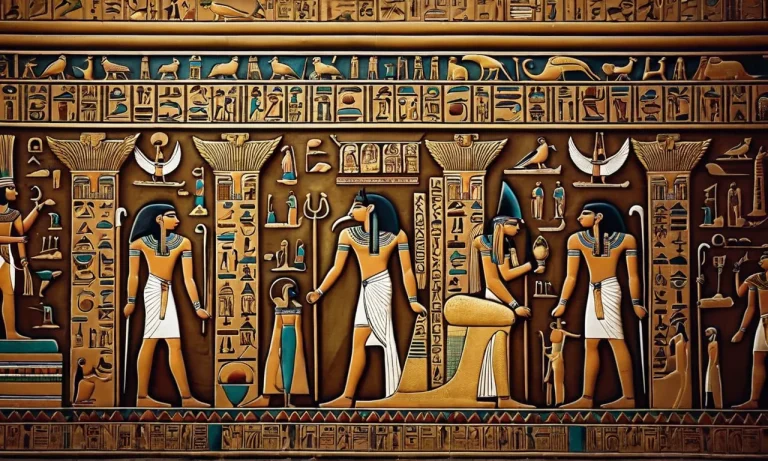Who Is Yahuah In The Bible: The Ultimate Guide
The identity of Yahuah is an important theological question for many readers of the Bible. Today we will look in-depth at who exactly Yahuah is according to the scriptures.
If you’re short on time, here’s a quick answer: Yahuah is the name of the supreme creator deity worshipped in ancient Israel and mentioned over 6,800 times in the Hebrew Bible. He is often referred to as the God of Israel or the God of the Israelites.
In this comprehensive guide, we will explore the many names and titles of Yahuah, his attributes, and character as described in the Old and New Testaments, his role in the Trinity, and the historical and theological significance of his identity for Judaism, Christianity, and the world.
The Many Names and Titles of Yahuah in the Bible
Yahuah (Yahweh)
Yahuah (also spelled Yahweh) is the most common Hebrew name for God in the Old Testament.
It comes from the Tetragrammaton YHWH, which likely means “He who is” or “He who causes to be.” Yahuah is the all-powerful, all-knowing, ever-present Creator of the universe.
He is the one true God who revealed Himself to the people of Israel.
Elohim
Elohim is a common Hebrew word for God that usually refers to God’s power and might. It is used over 2,500 times in the Old Testament. Elohim is actually plural, which could refer to the Trinity or God’s majesty and authority.
El
El is widely thought to mean “mighty” or “power.” It is often combined with other words to describe God in different ways. For example, El Elyon means “God Most High,” emphasizing God’s supreme authority.
El Shaddai
El Shaddai, meaning “God Almighty,” highlights God’s ultimate power and might. Shaddai comes from a word meaning “mountain” or “field,” portraying God as an immovable rock or firm foundation. El Shaddai provides stability and strength.
Adonai
Adonai means “Lord” or “Master” in Hebrew. It expresses reverence and submission to God’s sovereignty. Adonai is used in place of Yahweh, out of respect for God’s holy name.
Yah
Yah is a shortened version of Yahuah’s name, similar to calling someone “Tim” instead of “Timothy.” It often appears in Hebrew names like Isaiah, Jeremiah, and Nehemiah. Yah communicates God’s personal and relational nature.
Abba Father
Abba is an intimate Aramaic term for father, similar to “Papa” or “Daddy” in English. Abba Father highlights God’s loving and paternal relationship with His people (Romans 8:15). He cares for and protects us like a doting dad.
Key Attributes and Characteristics of Yahuah
Omnipotent
The Bible describes God as “El Shaddai” – the All Powerful One (Exodus 6:3). As the creator of everything, He has absolute control and authority over everything.
God’s power has no boundaries and nothing is impossible for God (Mark 10:27). His omnipotence proclaims He is able to accomplish anything consistent with His divine nature and will.
Omniscient
God is all-knowing or omniscient. God declares in Isaiah 46:9, “For I am God, and there is no other; I am God, and there is none like Me.”
As the creator, God has complete knowledge of everything. Nothing is hidden from God (Psalm 139:2-12).
He knows everything that exists and everything that is possible (1 John 3:20). His omniscience comes from His eternal and infinite perspective and understanding of everything, past, present and future. As Christians, we trust that God knows everything about us and has a purpose for our lives.
Omnipresent
God is everywhere all the time and cannot be contained or excluded from any place or time. His presence fills heaven and Earth (Jeremiah 23:24).
As Psalm 139:7-10 declares, there is no place we can go that God is not already there.
Though God is transcendent, He is also personally present everywhere; He is both infinite and personal, the almighty ruler of the universe who cares for each of us. As believers, we can take comfort that God is always present with us.
Eternal
God has always existed and will always exist. He was not created and will not be destroyed (Psalm 90:2). He is the beginning and the end, the first and the last (Revelation 22:13).
Being eternal, He sees and knows the past, present and future all at once. There was never a time when God did not exist.
He has life in Himself and derives existence from nowhere outside of Himself (John 5:26). For Christians, knowing God is eternal gives confidence that His purposes will prevail forever.
Holy
God’s defining characteristic is His holiness – His perfect moral goodness and purity. As 1 John 1:5 states, “God is light; in Him there is no darkness at all”.
There is absolutely no darkness or sin found in Him. He is completely separate from evil and sin (James 1:13).
Leviticus 19:2 tells to “be holy because I, the Lord your God, am holy.” We are called to pursue holiness because God Himself is the personification of holiness. And one day, we will be perfectly sanctified by Him.
Righteous
The righteousness of God refers to the fact that He always acts rightly in perfect accordance to His character and promises.
God cannot contradict Himself or act in discord with His nature. As Deuteronomy 32:4 declares, “His works are perfect, and all His ways are just.
A faithful God who does no wrong.” Because God is righteous, He hates injustice. He defends the oppressed and acts justly towards those who sin against Him. In Christ, God’s righteousness is mercifully extended to us rebels to restore us to Himself (Psalm 11:7; Psalms 71:15).
Loving
The most profound truth about God in the Bible is that He is love (1 John 4:8). God eternally exists in perfect love demonstrated fully within the triune nature of God – Father, Son and Spirit who eternally love one another.
And God’s love is demonstrated most profoundly through sending His Son to endure God’s wrath against sin for our salvation (Romans 5:8; John 3:16).
His love knows no boundaries as He extends His great kindness, mercy and grace to all who call upon Him.
God’s perfect love compels us to love Him above all else in return.
Merciful
Mercy is God withholding deserved punishment. Although God is just and righteous, He is also rich in mercy and compassion towards sinners (Psalm 51:1; Ephesians 2:4). God’s mercy is most vividly seen at the cross where Jesus died for utterly undeserving sinners (Titus 3:5).
We contribute nothing to our salvation – it is solely by God’s underserved grace and mercy that we are saved from sin.
As 1 Peter 1:3 wonderfully declares, “In his great mercy he has given us new birth into a living hope through the resurrection of Jesus Christ from the dead.”

Yahuah’s Role in the Trinity
The Trinity in Scripture
The doctrine of the Trinity states that Yahuah exists as three persons – Father, Son, and Holy Spirit – in one divine essence. Though the word “Trinity” is not found in Scripture, it is derived from the triune nature of Yahuah revealed in the Bible.
There are several passages in the Old Testament that hint at the plurality within the one Yahuah (Genesis 1:26, Genesis 3:22, Genesis 11:7). The New Testament more clearly reveals the doctrine of the Trinity.
At Jesus’ baptism, the Father speaks from heaven, the Son is baptized, and the Spirit descends like a dove (Matthew 3:16-17).
Jesus commands his followers to baptize new believers in the name of the Father, Son, and Holy Spirit (Matthew 28:19).
Other passages mention all three persons of the Trinity together (Romans 8:9-11, 1 Corinthians 12:4-6, 2 Corinthians 13:14, Ephesians 4:4-6).
Relationship to Jesus Christ
In Scripture, Yahuah the Father and Yahuah the Son are distinct persons. Jesus frequently distinguishes himself from the Father, yet asserts that he and the Father are one (John 10:30).
The Father sends the Son into the world (John 3:16) and gives him authority (Matthew 28:18).
Yet the Son perfectly reveals the Father, declaring “Anyone who has seen me has seen the Father” (John 14:9). Jesus is the unique Son of Yahuah (Mark 1:11), yet eternally co-existent with Him (John 1:1-3).
The relationship between the Father and the Son reveals both distinction of persons and unity of being. The Father refers to Jesus as “my beloved Son” (Matthew 3:17) and Jesus submits himself to the will of His Father (Luke 22:42).
Their mutual love, honor, and intimate knowledge of each other point to their distinct personhood (John 3:35, John 5:20).
Yet Jesus boldly declares “I and the Father are one” (John 10:30). He bears the names and attributes of Yahuah, further indicating their shared divine essence (Isaiah 9:6, John 1:1, Colossians 1:15-20).
Relationship to the Holy Spirit
The Holy Spirit is also a distinct person within the Trinity. Like the Father and Son, the Spirit has intellect (1 Corinthians 2:10-11), feelings (Ephesians 4:30), and will (1 Corinthians 12:11).
He speaks (Acts 13:2), teaches (John 14:26), testifies (John 15:26), guides (John 16:13), commissions (Acts 13:4) and intercedes (Romans 8:26-27).
Scripture refers to the Spirit with personal pronouns (John 14:17, Romans 8:16, 26). His personhood is displayed through his involvement in relationships, especially with the Son.
Though distinct, the Holy Spirit is inseparable from the Father and the Son. He proceeds from the Father through the Son (John 15:26). The Son sends the Spirit to believers once He returns to the Father (John 16:7).
Together the three persons of the Trinity unite for the work of salvation (1 Peter 1:2). This close fellowship and cooperation within distinct roles reflect the mystery and beauty of the triune Yahuah.
The Historical and Theological Significance of Yahuah
Importance for Judaism
Yahuah is considered the one true God in Judaism. He is the creator and ruler of the universe. Yahuah established a covenant with Abraham, the first Jew, promising to make his descendants a great nation if they worshipped only Him.
This monotheistic belief set Judaism apart from the polytheistic religions of the ancient world.
The Torah and Tanakh detail Yahuah’s revelation to the Jewish people and form the foundation of their faith. Generations of Jews have found meaning and purpose through obedience to Yahweh’s commandments.
His sovereignty and justice undergird their worldview.
Importance for Christianity
Christians believe Yahuah is the Father of Jesus Christ. Through Christ’s sacrificial death and resurrection, Yahuah offered salvation to all who believe in His Son. The New Testament presents Yahuah as a God of love, grace, and forgiveness.
Christians find purpose in glorifying Him and building His kingdom on earth. Yahuah sent the Holy Spirit to dwell in believers, guiding them in obedience and truth.
Faith in the triune nature of Yahuah as Father, Son, and Spirit defines Christianity theologically.
Yahuah’s transcendence grounds moral absolutes, while His immanence enables a close relationship with each person.
Conclusion
In conclusion, Yahuah is the supreme creator God in the Hebrew Bible, possessing characteristics such as omnipotence, omniscience, and holiness. He relates to humanity as a righteous yet loving and merciful Father.
Yahuah holds great theological significance in Judaism as the God of Israel and in Christianity as one person of the Trinity. Understanding the identity of Yahuah provides invaluable insight into the nature of God and the foundations of monotheistic faith.








